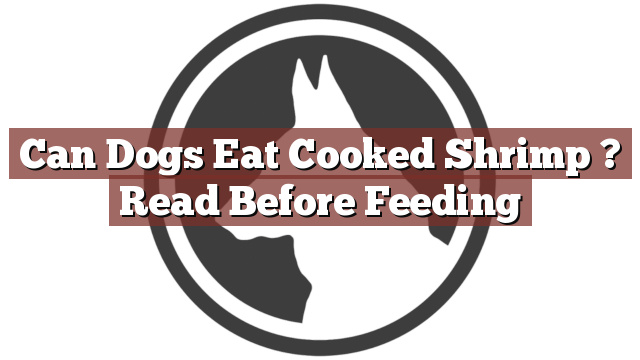Understanding Your Dog’s Dietary Needs
As a responsible pet owner, it is essential to understand your dog’s dietary needs to ensure their overall health and well-being. While dogs are primarily carnivores, their diet can also include various other foods to provide them with the necessary nutrients. However, not all human foods are safe for dogs to consume. It is crucial to be aware of what foods are suitable for your furry friend and what can potentially harm them.
Can Dogs Eat Cooked Shrimp? Read Before Feeding
Can dogs eat cooked shrimp? This is a common question among pet owners who enjoy seafood and want to share it with their canine companions. The answer is yes, dogs can eat cooked shrimp, but with certain precautions. Shrimp can be a healthy addition to your dog’s diet as it is low in fat and an excellent source of protein. However, before feeding shrimp to your dog, there are a few factors to consider.
Pros and Cons of Feeding Cooked Shrimp to Dogs
Feeding cooked shrimp to your dog can have its pros and cons. Let’s explore them below.
Pros:
- Protein-rich: Shrimp is a great source of protein, which is essential for your dog’s muscle development and overall growth.
- Low in fat: Shrimp is relatively low in fat compared to other meats, making it a healthier option for dogs on a low-fat diet or those prone to weight gain.
- Nutrient-dense: Shrimp contains various vitamins and minerals, including vitamin B12, phosphorus, and selenium, which can benefit your dog’s overall health.
- Easy to digest: Cooked shrimp is relatively easy for dogs to digest, making it a suitable option for those with sensitive stomachs.
Cons:
- Allergies: Just like humans, some dogs may have allergies or sensitivities to seafood, including shrimp. It is important to introduce shrimp to your dog’s diet gradually and monitor for any adverse reactions.
- Seasonings and preparation: Dogs should only consume plain, unseasoned cooked shrimp. Avoid using any spices, seasonings, or oils that may be harmful to dogs, such as garlic, onion, or high amounts of salt.
Conclusion: Assessing the Risks and Benefits of Including Cooked Shrimp in Your Dog’s Diet
In conclusion, while dogs can eat cooked shrimp, it is crucial to consider the potential risks and benefits. If you decide to introduce cooked shrimp to your dog’s diet, ensure it is plain, unseasoned, and served in moderation. Always monitor your dog for any adverse reactions such as stomach upset, vomiting, or allergic symptoms. If you have any doubts or concerns about feeding shrimp to your dog, it is best to consult your veterinarian for personalized advice based on your dog’s specific dietary needs and health condition.
Remember, a balanced and nutritious diet tailored to your dog’s individual needs is the key to their overall well-being.
Thank you for taking the time to read through our exploration of [page_title]. As every dog lover knows, our furry friends have unique dietary needs and responses, often varying from one canine to another. This is why it's paramount to approach any changes in their diet with caution and knowledge.
Before introducing any new treats or making alterations to your dog's diet based on our insights, it's crucial to consult with a veterinarian about [page_title]. Their expertise ensures that the choices you make are well-suited to your particular pet's health and well-being.
Even seemingly harmless foods can sometimes lead to allergic reactions or digestive issues, which is why monitoring your dog after introducing any new food item is essential.
The content provided here on [page_title] is crafted with care, thorough research, and a genuine love for dogs. Nevertheless, it serves as a general guideline and should not be considered a substitute for professional veterinary advice.
Always prioritize the expert insights of your veterinarian, and remember that the health and happiness of your furry companion come first.
May your journey with your pet continue to be filled with joy, love, and safe culinary adventures. Happy reading, and even happier snacking for your canine friend!

